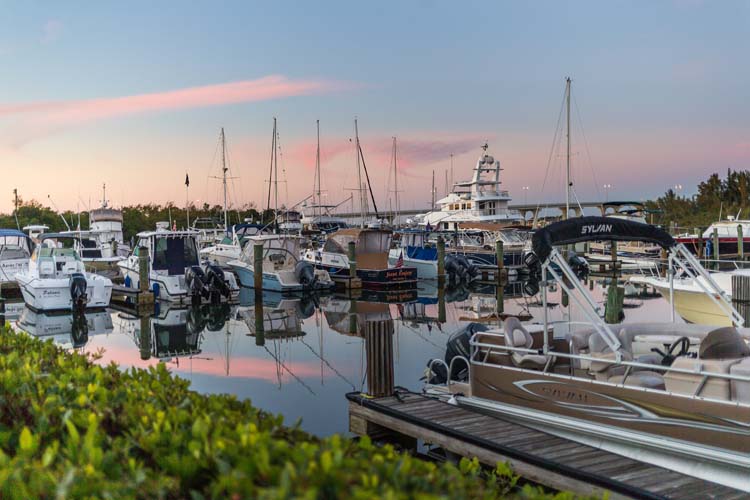
With the Vero Beach Municipal Marina at capacity much of the season, and well-used year around, the city government is fishing for ideas on how to run it efficiently enough to afford upkeep and much-needed renovations.
The marina is technically a municipal enterprise fund, meaning it is supposed to be self-supporting, and this year, the marina’s submitted $1.7 million budget looks balanced.
But that hasn’t always been the case. The city has frequently bailed the marina out, using property tax dollars, on the premise that having such an amenity enhances the overall quality of life in Vero Beach and helps boost the local economy.
The marina’s website states that more than 3,000 vessels visit per year, resulting in 20,000 overnight stays. Slips and mooring ball spots are rented nightly, weekly and monthly, and people staying over on their boats spend money at stores, restaurants and other venues.
City Manager Jim O’Connor recently announced a possible solution to the recurring bailout problem that could right the ship, but it would take a major infusion of cash.
“If you follow the recommendations of the Finance Commission, we will be taking some of our proceeds of the electric sale and retiring the debt at the marina, freeing up somewhere in the neighborhood of $300,000 a year that could go into capital projects, which is what the marina really needs,” O’Connor said.
To get the project rolling, O’Connor obtained a proposal from Milwaukee-based F3 Marina, a national firm that manages facilities such as the Navy Pier Marina in Chicago, the Village of Egg Harbor Marina in Wisconsin and the Titusville Marina in northern Brevard County. F3 took over the Titusville Marina after a national search in 2015.
City Council member Val Zudans said F3 was tactful in pointing out the poor condition of the Vero’s municipal marina, but that the failings are, in fact, many. He reminded the council about an incident last year when a woman was dumped into the water when a dock collapsed beneath her. Marina staff said the most serious issues have been repaired, but work is ongoing.
Zudans said after reviewing all the data and the proposal, it was clear “there’s definitely room for improvement in our city marina. It’s an entryway into our city, it reflects upon us and there are shortcomings there.”
The previous City Council tasked the Marine Commission with devising a master plan for the marina such as the Airport Commission has done for the Vero Beach Regional Airport property.
The marina effort is still underway, said Harbormaster Tim Grabenbauer, so there’s no formal document yet that details goals for managing and marketing it. In that vacuum, the council’s aspiration is to have enough cash to give Vero a first-class marina facility without draining the city’s general fund.
Rather than a targeted approach, Zudans wants to cast a wide net for ideas. “I want to see what’s available to us,” he said. “I think there’s very little harm in starting to prepare a very open-ended Request for Proposals.”
Some baseline things city officials seem to agree upon are expanding the marina’s dry storage to accommodate larger vessels, making sure the marina is safe, and providing prompt, responsive service that will impress visitors – whether pumping fuel or accommodating tenants.
The F3 proposal pointed out that Vero needs to accentuate its positives, one of which is proximity to local shops, restaurants, the beach and local attractions.
One idea floated is to start a local land or water shuttle service for marina customers who don’t have automobiles, to better connect them to the countywide bus system.
In addition to spiffing the marina up and connecting it with the larger community, F3 recommends “rebranding” it and launching a strategic marketing campaign to draw in more customers.
“I live in that neighborhood, so I guarantee you that I don’t want anything that would be detrimental to my neighborhood, and I happen to know that Laura Moss also lives in that neighborhood, so I assume that she does not want anything negative in that neighborhood either,” Zudans said, assuring the public that any improvement options would be fully vetted and voted on.
“There may be someone out there who is willing to make the capital improvements that we, the city, cannot afford,” Zudans said. “This is not an attempt to turn things over to private enterprise. This is to look and see what we can do as city council members to … make sure we’re doing the best thing for [the marina].”
The cost of having a company manage and staff the marina is unknown, but the marina’s current revenues and expenses are public record. According to Vero’s published 2017-18 budget, the marina has three fulltime employees plus three part-time employees.
The total payroll doesn’t seem excessive, with salaries totaling $203,000 including overtime pay, but the cost of benefits for the fulltime workers is high.
If the marina was leased to a private management company, presumably that firm would compensate employees whatever the going rate is in the commercial marina industry.
The city will discuss the issue further as part of the 2018-19 budget process so that city staff can draft a Request for Proposals to bring back to the council later this spring.
Councilman Tony Young said he understands that there’s a consensus that “the status quo is not acceptable,” but that the city needs to figure out exactly what it wants sooner rather than later.
“My sense is that the greatest liability to the marina is us, the fickleness of the council,” Young said.
“The decline of the marina has come with the decisions of the City Council that we’re not going to invest in it,” Young said, resulting in a marina that doesn’t meet the standards. “Let’s get it right.”



